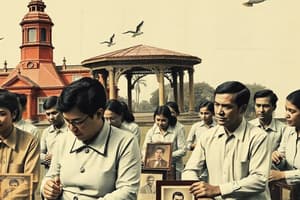Podcast
Questions and Answers
What was one of the main reasons for Rizal's execution?
What was one of the main reasons for Rizal's execution?
- Publishing anti-Spanish literature
- Attempting to overthrow the government
- Treason and inciting rebellion (correct)
- Espionage against the Spanish government
Which of the following works by Rizal criticized Spanish rule?
Which of the following works by Rizal criticized Spanish rule?
- La Liga Filipina
- The Philippines a Century Hence
- El Filibusterismo (correct)
- Mi Ultimo Adios
During his exile in Dapitan, Rizal focused on which of the following areas?
During his exile in Dapitan, Rizal focused on which of the following areas?
- Political activism against the Spanish government
- Organizing an armed revolt
- Education, agriculture, and medicine (correct)
- Writing his autobiography
What does the character Elias in Noli Me Tangere symbolize?
What does the character Elias in Noli Me Tangere symbolize?
What key idea does Rizal emphasize in his essays?
What key idea does Rizal emphasize in his essays?
Which female figure symbolizes the ideal Filipina in Rizal's novels?
Which female figure symbolizes the ideal Filipina in Rizal's novels?
Rizal's beliefs about youth primarily revolved around what concept?
Rizal's beliefs about youth primarily revolved around what concept?
What does Rizal's work in ophthalmology signify in the context of his contributions?
What does Rizal's work in ophthalmology signify in the context of his contributions?
Flashcards
Rizal's Writings and Advocacy
Rizal's Writings and Advocacy
Rizal's novels, "Noli Me Tangere" and "El Filibusterismo", criticized Spanish rule and called for reform.
Rizal's Execution and Influence
Rizal's Execution and Influence
Rizal's execution for treason united Filipinos and strengthened the revolution against Spain.
Rizal's Exile in Dapitan
Rizal's Exile in Dapitan
Rizal's exile to Dapitan highlights themes of separation from family and cultural identity, while showcasing his dedication to education, agriculture, and medicine.
Rizal's Education and Travels
Rizal's Education and Travels
Signup and view all the flashcards
Rizal's Nationalism and Legacy
Rizal's Nationalism and Legacy
Signup and view all the flashcards
Rizal's Symbolism and Commemoration
Rizal's Symbolism and Commemoration
Signup and view all the flashcards
Key Female Figures in Rizal's Life
Key Female Figures in Rizal's Life
Signup and view all the flashcards
Rizal's Role in Philippine Society
Rizal's Role in Philippine Society
Signup and view all the flashcards
Study Notes
Rizal's Execution and Influence
- Rizal was executed on December 30, 1896, in Luneta (Bagumbayan), Manila, for treason and inciting rebellion.
- His death galvanized Filipinos and strengthened the revolution against Spain.
- Andres Bonifacio led the revolutionary forces after Rizal's passing.
Rizal's Writings and Advocacy
- Rizal's novels Noli Me Tangere and El Filibusterismo criticized Spanish rule and advocated for reforms.
- He championed peaceful reform and Filipino rights, rather than armed revolution.
- He established La Liga Filipina to promote equality and mutual aid.
- Mi Ultimo Adios expresses his love for the Philippines and acceptance of his fate.
Rizal and Contemporary Issues
- Rizal's martyrdom relates to contemporary human rights concerns, particularly extrajudicial killings.
- His advocacy for women's rights is linked to modern gender equality movements.
- His experiences abroad resonate with the challenges faced by Overseas Filipino Workers (OFWs).
Rizal's Exile in Dapitan
- Rizal was exiled to Dapitan, where he dedicated himself to education, agriculture, and medicine.
- His exile symbolizes separation from family and the preservation of cultural identity.
- He contributed to education and public health during his Dapitan exile.
Rizal's Education and Travels
- Rizal studied ophthalmology in Germany.
- His European travels exposed him to democratic ideals and social progress.
- He played a role in the Propaganda Movement, advocating for Filipino interests in Europe.
Rizal's Nationalism and Legacy
- Rizal believed in peaceful reforms, education, and civic engagement.
- He predicted Philippine independence in "The Philippines a Century Hence."
- Ibarra in Noli Me Tangere represents the enlightened Filipino, reflecting Rizal's ideals.
- Elias symbolizes the marginalized and oppressed in Philippine society.
- He highlighted the importance of education for freedom.
- His medical practice exemplifies a commitment to public service.
Rizal's Symbolism and Commemoration
- The pen symbolizes Rizal's advocacy for reform.
- The Rizal Monument in Luneta commemorates his execution.
- Rizal Day is celebrated annually on December 30th.
Key Female Figures in Rizal's Life
- Maria Clara represents the ideal Filipina in Rizal's novels.
- Leonor Rivera was a significant figure in Rizal's life.
- Rizal's letters to Filipina women emphasized the importance of education and empowerment.
Rizal's Role in Philippine Society
- Rizal advocated for religious and cultural harmony, similar to contemporary peace initiatives in Mindanao.
- He criticized the abuses of Spanish friars and supported secularization.
- He saw the youth as a vital force for national progress and inspired patriotism.
- Rizal's family was supportive of his advocacy and ideals.
Rizal's Final Contributions and Vision
- Rizal's "Filipinas dentro de cien años" envisioned a self-sufficient and independent Philippines.
- His advocacy for human rights is linked to modern legislation, like the Magna Carta for Women and the Anti-Discrimination Act.
- Rizal viewed education as instrumental to national development and liberation.
Studying That Suits You
Use AI to generate personalized quizzes and flashcards to suit your learning preferences.




